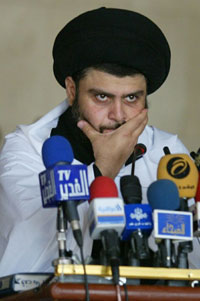
Firefight greets return of SadrAmericans capture key militia figure in Sadr City raid, kill five in air strikes BAGHDAD, Saturday, (AP) - A day after radical Shiite cleric Muqtada al-Sadr resurfaced to end nearly four months in hiding and demand U.S. troops leave Iraq, American forces raided his Sadr City stronghold in Baghdad and killed five suspected militia fighters in air strikes, the U.S. military said in statement today. The military said U.S. and Iraqi forces called in the air strikes after a raid in which they captured a ''suspected terrorist cell leader.'' EFP's are deadly roadside bombs that hurl a fist-size slug of molten copper that penetrates armor, a weapon that has been highly effective against American forces over the past year. The militia fighters were killed in air strikes on nine cars that were seen positioning themselves to attack American forces after the raid, the military said. Al-Sadr's reappearance in the fourth month of the U.S.-Iraqi security crackdown on Baghdad and environs was expected to complicate the mission to crack down on violence and broker political compromise in the country. Hours after the cleric spoke at a key Shiite shrine in Kufa, about 160 kilometres (100 miles) south of Baghdad, the notorious leader of al-Sadr's Mahdi Army militia in the city of Basra was killed in a shootout as British and Iraq troops tried to arrest him, police and the British military said, further inflaming tensions in the Shiite areas of southern Iraq. The U.S. military also announced the deaths of eight U.S. soldiers and one Marine, putting May on pace to be one of the deadliest months for U.S. forces here in years. Al-Sadr went underground -- reportedly in Iran -- at the start of the U.S.-led security crackdown on Baghdad 14 weeks ago. He also had ordered his militia off the streets to prevent conflict with U.S. forces. His return to the Shiite holy city of Najaf appeared to be an effort by the 33-year-old firebrand cleric to regain control over his militia, which had begun fragmenting, and to take advantage of the illness of a Shiite rival. There had also been some indication that his absence from the national arena was costing him political support. Al-Sadr drove in a long motorcade from Najaf to its sister city of Kufa to deliver an anti-American sermon to 6,000 chanting supporters at the main mosque. ''No, no for Satan. No, no for America. No, no for the occupation. No, no for Israel,'' the glowering, black-turbaned cleric chanted in a call and response with the crowd. ''We demand the withdrawal of the occupation forces, or the creation of a timetable for such a withdrawal,'' he said, wiping sweat from his brow with a white cloth as temperatures hovered at 113 degrees. ''I call upon the Iraqi government not to extend the occupation even for a single day.'' While the call for a U.S. pullout was nothing new, al-Sadr also peppered his speech with nationalist overtones, criticizing the government for not providing services, appealing to his followers not to fight with Iraqi security forces and reaching out to Sunnis. Al-Sadr did not address his reasons for returning. However, during his time in absentia his militia appeared to have split into a faction calling itself the ''noble Mahdi Army'' and more extremist elements that it accuses of killing innocent Sunnis and embezzling funds. Some members of the more moderate faction were even willing to provide the U.S. military with information on their rivals in an effort to purge the militia. In addition to trying to rein in the force, Al-Sadr is also believed to be honing plans to consolidate political gains and foster ties with Iran _ and possibly trying to capitalize on the illness of Supreme Islamic Council of Iraq leader Abdul-Aziz al-Hakim, who was recently diagnosed with lung cancer and went to Iran for treatment. Al-Sadr's associates say his strategy rests in part on his belief that Washington will soon start reducing troop strength, leaving behind a hole in Iraq's security and political power structure that he can fill.
|
|| Front
Page | News | Editorial | Columns | Sports | Plus | Financial
Times | International | Mirror | TV
Times | Funday
Times || |
| |
Copyright
2007 Wijeya
Newspapers Ltd.Colombo. Sri Lanka. |
